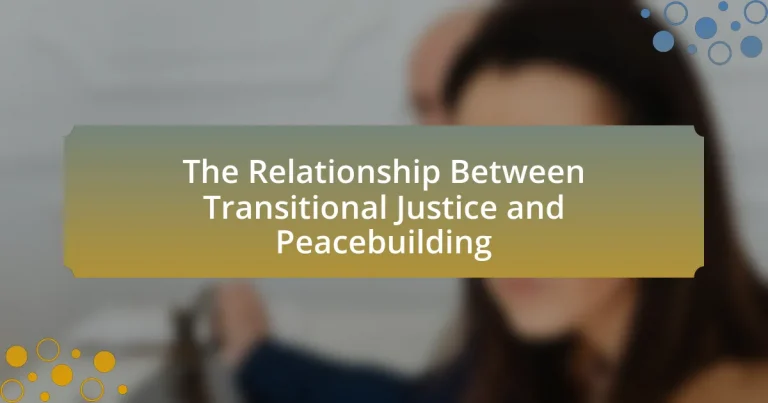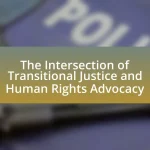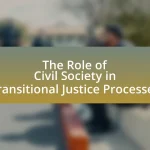Transitional justice and peacebuilding are interconnected processes aimed at addressing the aftermath of conflict and fostering sustainable peace. This article explores how transitional justice mechanisms, such as truth commissions and reparations, contribute to reconciliation and accountability, thereby rebuilding trust within communities. It examines the principles of transitional justice, the role of peacebuilding in supporting these processes, and the challenges faced in integrating both approaches. Additionally, it highlights effective strategies and best practices for enhancing the relationship between transitional justice and peacebuilding, emphasizing the importance of local community engagement and inclusivity in achieving long-term stability.
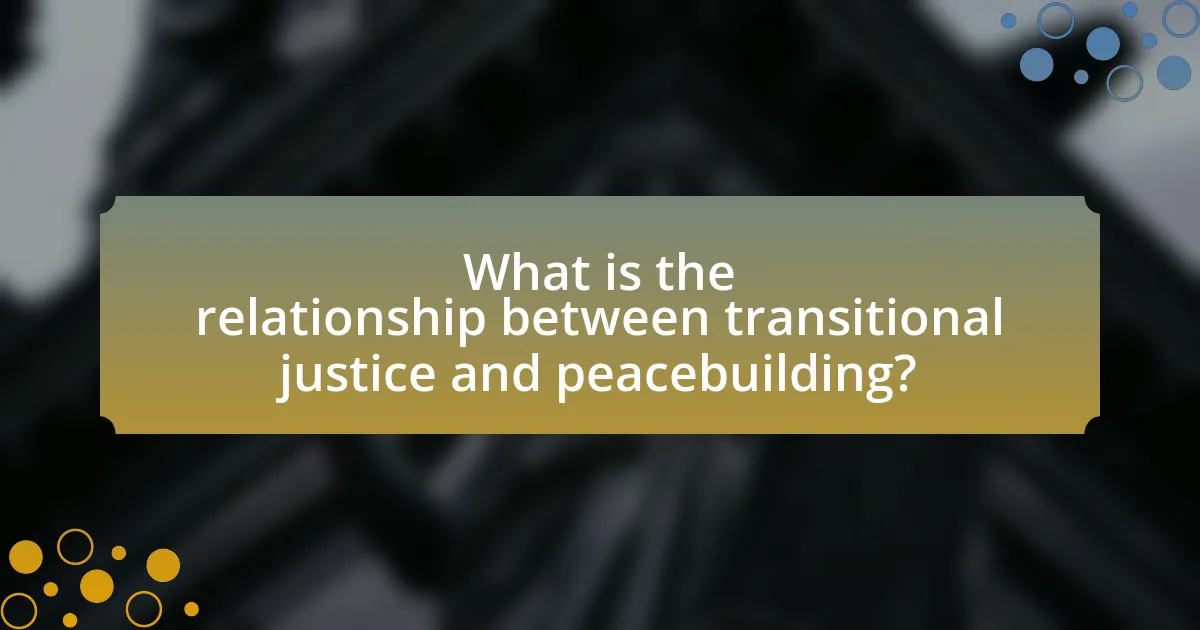
What is the relationship between transitional justice and peacebuilding?
Transitional justice and peacebuilding are interconnected processes that aim to address the aftermath of conflict and promote sustainable peace. Transitional justice mechanisms, such as truth commissions and reparations, seek to acknowledge and rectify past human rights violations, thereby fostering reconciliation among affected communities. This acknowledgment is crucial for peacebuilding, as it helps to rebuild trust in institutions and society, which is essential for preventing future conflicts. Research indicates that societies that implement transitional justice measures are more likely to achieve lasting peace, as these measures contribute to a shared understanding of the past and facilitate dialogue among conflicting parties.
How do transitional justice and peacebuilding intersect?
Transitional justice and peacebuilding intersect by addressing the root causes of conflict and promoting reconciliation in post-conflict societies. Transitional justice mechanisms, such as truth commissions and reparations, aim to acknowledge past atrocities and provide accountability, which fosters trust among communities. For instance, the Truth and Reconciliation Commission in South Africa played a crucial role in healing the nation after apartheid by facilitating dialogue and understanding between victims and perpetrators. This process of acknowledging historical injustices directly supports peacebuilding efforts by creating a foundation for sustainable peace and preventing the recurrence of violence.
What are the key principles of transitional justice?
The key principles of transitional justice include accountability, truth-seeking, reparations, and institutional reform. Accountability ensures that perpetrators of human rights violations are held responsible, which is essential for restoring trust in the rule of law. Truth-seeking involves uncovering the facts about past abuses to promote healing and reconciliation within society. Reparations provide compensation and acknowledgment to victims, addressing their suffering and facilitating their reintegration into society. Institutional reform aims to transform state institutions to prevent future violations, ensuring that justice mechanisms are effective and equitable. These principles collectively contribute to building a foundation for sustainable peace and stability in post-conflict societies.
How does peacebuilding contribute to transitional justice processes?
Peacebuilding contributes to transitional justice processes by creating an environment conducive to reconciliation and accountability. It fosters dialogue among conflicting parties, which is essential for addressing grievances and establishing trust. For instance, peacebuilding initiatives often include community engagement and dialogue sessions that allow victims and perpetrators to share their experiences, facilitating healing and understanding. Additionally, peacebuilding efforts can lead to the establishment of institutions that support the rule of law, which is critical for implementing transitional justice mechanisms such as truth commissions and reparations programs. Historical examples, such as the post-apartheid South Africa, demonstrate how peacebuilding efforts, like the Truth and Reconciliation Commission, were integral in addressing past injustices while promoting national unity.
Why is the relationship between transitional justice and peacebuilding important?
The relationship between transitional justice and peacebuilding is important because it fosters sustainable peace by addressing past injustices and promoting reconciliation. Transitional justice mechanisms, such as truth commissions and reparations, help societies confront legacies of violence and human rights abuses, which can otherwise hinder peace efforts. For instance, the Truth and Reconciliation Commission in South Africa played a crucial role in healing the nation post-apartheid by acknowledging victims’ experiences and fostering dialogue. This connection ensures that peacebuilding efforts are not merely superficial but are rooted in justice and accountability, thereby reducing the likelihood of future conflicts.
What role does justice play in sustainable peace?
Justice plays a critical role in sustainable peace by addressing grievances, promoting accountability, and fostering reconciliation among conflicting parties. When justice mechanisms, such as truth commissions and reparations, are implemented, they help to acknowledge past wrongs and provide a platform for victims to voice their experiences. This acknowledgment is essential for rebuilding trust within communities, as evidenced by the post-apartheid Truth and Reconciliation Commission in South Africa, which facilitated dialogue and healing after decades of systemic injustice. Furthermore, ensuring accountability for perpetrators of violence deters future violations and reinforces the rule of law, contributing to a stable and peaceful society. Studies indicate that societies that prioritize justice in their peacebuilding efforts are more likely to achieve long-term stability and prevent the recurrence of conflict.
How can addressing past injustices prevent future conflicts?
Addressing past injustices can prevent future conflicts by fostering reconciliation and building trust among affected communities. When societies acknowledge and rectify historical wrongs, such as human rights violations or systemic discrimination, they create a foundation for healing and cooperation. For example, the Truth and Reconciliation Commission in South Africa helped to address the injustices of apartheid, allowing for dialogue and understanding, which significantly contributed to the country’s stability post-transition. Studies indicate that societies that engage in transitional justice measures, such as reparations and public acknowledgment of past wrongs, experience lower rates of violence and conflict recurrence, as these actions promote social cohesion and deter future grievances.
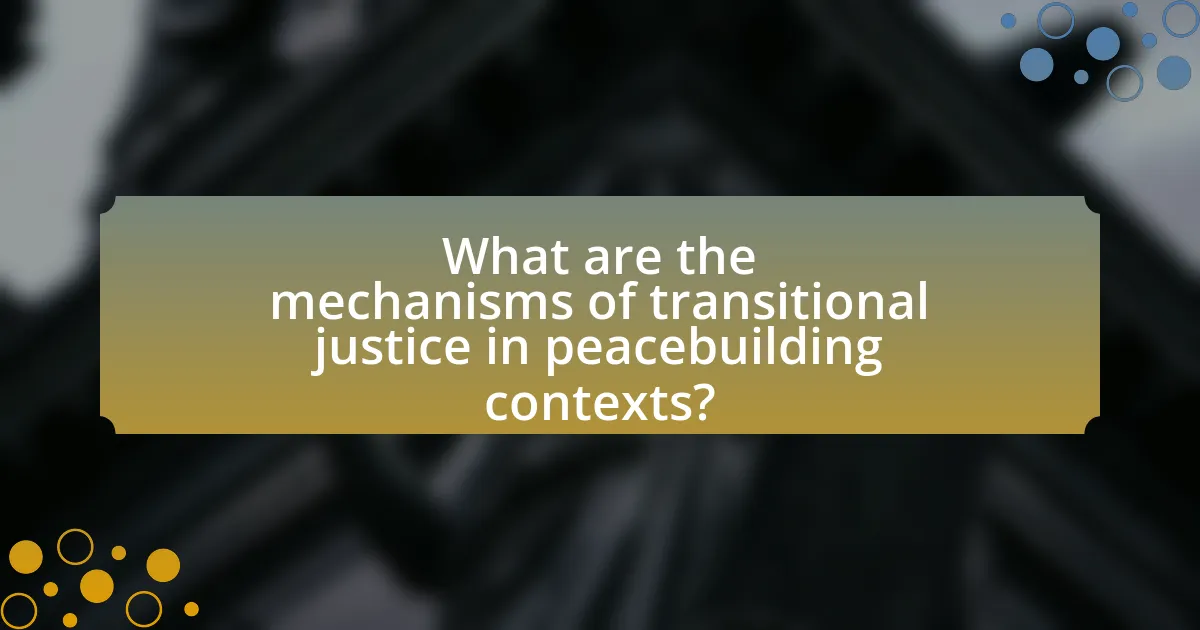
What are the mechanisms of transitional justice in peacebuilding contexts?
Transitional justice mechanisms in peacebuilding contexts include truth commissions, reparations, criminal prosecutions, and institutional reforms. Truth commissions, such as South Africa’s Truth and Reconciliation Commission, facilitate dialogue about past atrocities, promoting national healing and understanding. Reparations provide compensation to victims, acknowledging their suffering and fostering social cohesion. Criminal prosecutions, like those conducted by the International Criminal Court, hold perpetrators accountable, deterring future violations. Institutional reforms aim to strengthen governance and human rights protections, ensuring that the conditions leading to conflict do not recur. These mechanisms collectively contribute to building a foundation for sustainable peace by addressing grievances and fostering trust among communities.
What types of transitional justice mechanisms are commonly used?
Transitional justice mechanisms commonly used include truth commissions, criminal prosecutions, reparations programs, and institutional reforms. Truth commissions, such as South Africa’s Truth and Reconciliation Commission, aim to uncover past human rights violations and promote healing. Criminal prosecutions, exemplified by the International Criminal Court, hold perpetrators accountable for atrocities. Reparations programs provide compensation to victims, as seen in various post-conflict societies. Institutional reforms focus on restructuring governmental and legal systems to prevent future abuses, which is critical for sustainable peacebuilding. These mechanisms collectively contribute to addressing legacies of violence and fostering reconciliation in post-conflict contexts.
How do truth commissions function in peacebuilding?
Truth commissions function in peacebuilding by uncovering the truth about past human rights violations, fostering reconciliation, and promoting accountability. These commissions investigate and document abuses, providing a platform for victims to share their experiences, which helps to acknowledge suffering and validate victims’ narratives. For instance, the South African Truth and Reconciliation Commission, established in 1995, played a crucial role in addressing apartheid-era atrocities, facilitating dialogue between victims and perpetrators, and contributing to national healing. By promoting transparency and accountability, truth commissions help to establish a foundation for sustainable peace and prevent the recurrence of violence.
What is the role of reparations in transitional justice?
Reparations play a crucial role in transitional justice by addressing the harm suffered by victims of human rights violations and fostering societal healing. They serve to acknowledge the suffering of individuals and communities, providing both symbolic and material compensation that can help restore dignity and promote reconciliation. Historical examples, such as the reparations provided to victims of apartheid in South Africa, illustrate how reparations can contribute to rebuilding trust and social cohesion in post-conflict societies. By facilitating acknowledgment of past injustices, reparations can also deter future violations and support the establishment of a more just and equitable society, thereby reinforcing the broader goals of peacebuilding.
How do these mechanisms support peacebuilding efforts?
Transitional justice mechanisms support peacebuilding efforts by addressing past human rights violations and fostering accountability, which helps to build trust among communities. These mechanisms, such as truth commissions and reparations programs, facilitate dialogue and reconciliation by acknowledging victims’ experiences and promoting healing. For instance, the South African Truth and Reconciliation Commission played a crucial role in transitioning from apartheid to a democratic society by allowing victims to share their stories, which contributed to national healing and unity. By promoting accountability and recognition of injustices, these mechanisms create a foundation for sustainable peace and prevent the recurrence of violence.
What impact do trials have on societal healing?
Trials have a significant impact on societal healing by promoting accountability and fostering a sense of justice among affected communities. When trials are conducted, they provide a platform for victims to share their experiences, which can validate their suffering and contribute to collective memory. This process helps to rebuild trust in institutions and encourages societal dialogue about past injustices. For instance, the International Criminal Tribunal for the former Yugoslavia (ICTY) played a crucial role in addressing war crimes, which not only acknowledged the victims’ experiences but also facilitated reconciliation efforts in the region. Such trials can lead to restorative outcomes, as they often result in reparations and policy changes aimed at preventing future atrocities, thereby reinforcing the social fabric necessary for lasting peace.
How do community-based approaches enhance peacebuilding?
Community-based approaches enhance peacebuilding by fostering local ownership and participation in conflict resolution processes. These approaches empower communities to identify their own needs and solutions, leading to more sustainable peace outcomes. For instance, research by the United Nations Development Programme indicates that local engagement in peace initiatives increases the likelihood of lasting peace by up to 50%. By involving community members, these approaches also build trust and social cohesion, which are essential for preventing future conflicts.
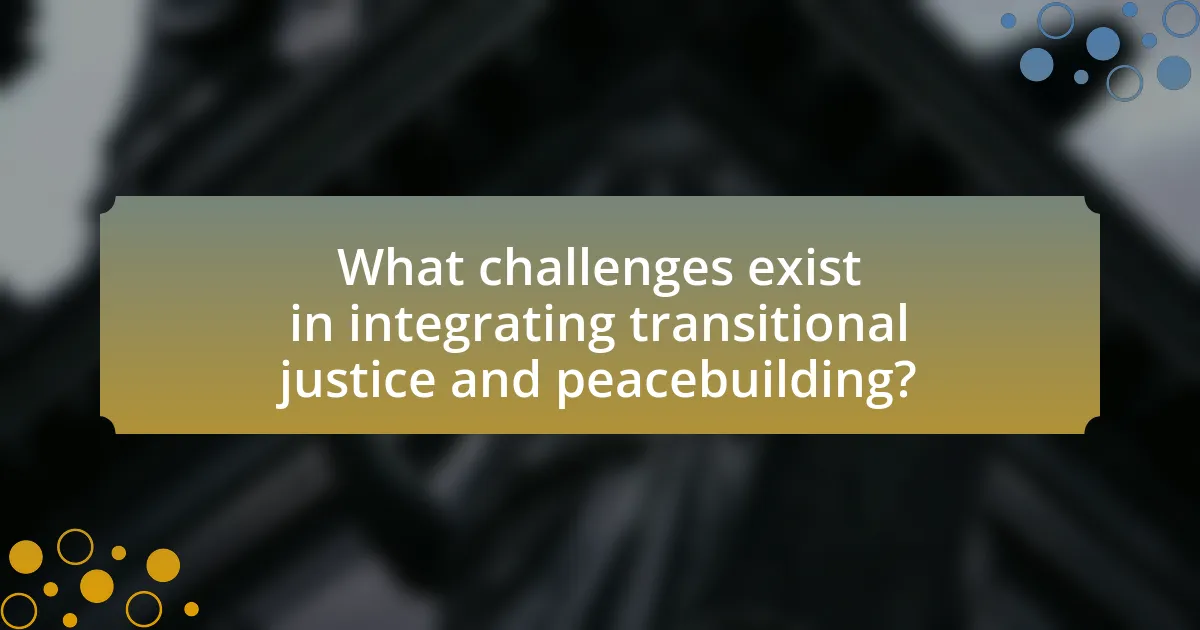
What challenges exist in integrating transitional justice and peacebuilding?
Integrating transitional justice and peacebuilding faces several challenges, primarily due to differing objectives and timelines. Transitional justice focuses on addressing past human rights violations and ensuring accountability, while peacebuilding emphasizes the establishment of sustainable peace and social cohesion. This divergence can lead to tensions, as the pursuit of justice may conflict with the need for immediate stability. For instance, in post-conflict societies, prioritizing trials for war crimes can disrupt ongoing peace negotiations, as seen in the cases of Rwanda and Bosnia. Additionally, the lack of local ownership and participation in transitional justice processes can undermine their effectiveness, as communities may feel alienated from decisions that affect their lives. These challenges highlight the complexity of aligning transitional justice with peacebuilding efforts, necessitating a careful balance to achieve both justice and lasting peace.
What are the common obstacles faced in this integration?
Common obstacles faced in the integration of transitional justice and peacebuilding include lack of political will, insufficient resources, and societal divisions. Political will is often hindered by power dynamics, where leaders may resist accountability measures that threaten their authority. Insufficient resources can limit the implementation of justice mechanisms, as seen in post-conflict societies where funding is scarce. Societal divisions, stemming from historical grievances, can impede consensus on justice processes, leading to tensions that undermine peacebuilding efforts. These obstacles are well-documented in various studies, including the United Nations’ reports on transitional justice, which highlight the critical need for comprehensive strategies to address these challenges effectively.
How do political dynamics affect transitional justice initiatives?
Political dynamics significantly influence transitional justice initiatives by shaping the political will and institutional capacity necessary for their implementation. For instance, in post-conflict societies, the presence of a stable government can facilitate the establishment of truth commissions and legal frameworks, as seen in South Africa’s Truth and Reconciliation Commission, which was supported by a strong political mandate. Conversely, political instability or lack of consensus among key stakeholders can hinder these initiatives, as evidenced in countries like Syria, where ongoing conflict has obstructed any meaningful transitional justice processes. Thus, the interplay between political stability, power relations, and public support directly impacts the effectiveness and sustainability of transitional justice efforts.
What are the limitations of transitional justice in post-conflict settings?
Transitional justice in post-conflict settings faces several limitations, including the challenge of achieving accountability while fostering reconciliation. These limitations arise from competing priorities, such as the need for immediate stability versus long-term justice. For instance, in countries like Rwanda, the push for rapid reconciliation sometimes undermined thorough judicial processes, leading to perceived injustices. Additionally, transitional justice mechanisms often lack adequate resources and political support, which can hinder their effectiveness. In many cases, victims may feel marginalized if their needs are not prioritized, as seen in the aftermath of the Bosnian War, where many survivors reported feeling excluded from the justice process. Furthermore, the complexity of societal divisions can complicate the implementation of transitional justice, as seen in Colombia, where ongoing violence and political instability have impeded progress. These factors collectively illustrate the multifaceted challenges transitional justice faces in effectively contributing to peacebuilding in post-conflict environments.
How can these challenges be addressed?
To address the challenges in the relationship between transitional justice and peacebuilding, a multi-faceted approach is essential. This includes integrating transitional justice mechanisms, such as truth commissions and reparations, into peace agreements to ensure that justice is part of the peace process. Research indicates that when transitional justice is embedded in peacebuilding efforts, it can enhance societal trust and reduce the likelihood of renewed conflict, as seen in countries like South Africa and Colombia. Furthermore, fostering inclusive dialogue among all stakeholders, including victims, can help to identify specific needs and grievances, thereby creating a more comprehensive and effective transitional justice framework.
What strategies can enhance the effectiveness of transitional justice in peacebuilding?
Strategies that can enhance the effectiveness of transitional justice in peacebuilding include fostering local ownership, ensuring inclusivity, and integrating restorative justice practices. Fostering local ownership involves engaging communities in the design and implementation of transitional justice mechanisms, which increases legitimacy and relevance, as evidenced by the success of community-led truth commissions in South Africa. Ensuring inclusivity means involving diverse groups, including marginalized populations, to address their specific grievances and promote social cohesion, as seen in the inclusive approaches taken in the Colombian peace process. Integrating restorative justice practices, such as mediation and dialogue, can facilitate healing and reconciliation, demonstrated by the effectiveness of restorative justice programs in post-conflict societies like Rwanda. These strategies collectively contribute to a more effective transitional justice framework that supports sustainable peacebuilding efforts.
How can stakeholder engagement improve outcomes?
Stakeholder engagement can improve outcomes by fostering collaboration and ensuring that diverse perspectives are considered in decision-making processes. This inclusive approach leads to more effective and sustainable solutions, as evidenced by the success of transitional justice initiatives that incorporate community input, which have shown to enhance trust and legitimacy in peacebuilding efforts. For instance, the United Nations Development Programme reported that participatory approaches in post-conflict settings significantly increase the likelihood of lasting peace, as they address the needs and concerns of affected populations directly.
What best practices can be adopted for effective integration?
Effective integration in the context of transitional justice and peacebuilding can be achieved through several best practices. First, fostering inclusive dialogue among all stakeholders, including victims, perpetrators, and community members, ensures diverse perspectives are considered, which enhances legitimacy and acceptance of the integration process. Second, establishing clear legal frameworks and policies that support transitional justice mechanisms, such as truth commissions and reparations, provides a structured approach to addressing past injustices and promoting accountability. Third, prioritizing local ownership of the integration process empowers communities to take charge of their healing and reconciliation efforts, leading to more sustainable outcomes. Research indicates that countries that adopt these practices, such as South Africa and Rwanda, experience more successful transitions from conflict to peace, as they address root causes of violence and build trust among communities.
What lessons can be learned from successful case studies?
Successful case studies in transitional justice and peacebuilding demonstrate the importance of inclusivity, accountability, and local ownership. These elements foster trust and cooperation among communities, which are essential for sustainable peace. For instance, the Truth and Reconciliation Commission in South Africa highlighted how inclusive dialogue can facilitate healing and reconciliation, leading to a more stable society. Additionally, the case of Rwanda’s Gacaca courts illustrates that local participation in justice processes can enhance community engagement and support for peace initiatives. These examples validate that successful transitional justice mechanisms contribute significantly to long-term peacebuilding efforts.
How can local communities be empowered in transitional justice processes?
Local communities can be empowered in transitional justice processes by actively involving them in decision-making and implementation. This empowerment can be achieved through mechanisms such as community consultations, participatory justice initiatives, and local truth commissions that prioritize the voices and needs of affected populations. For instance, the Truth and Reconciliation Commission in South Africa engaged local communities to address grievances and promote healing, demonstrating that community involvement can enhance legitimacy and effectiveness in transitional justice. Additionally, providing education and resources to local communities about their rights and the transitional justice process fosters greater participation and ownership, leading to more sustainable peacebuilding outcomes.
